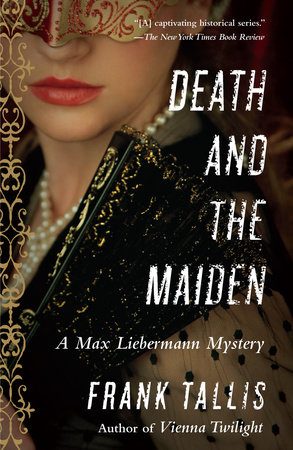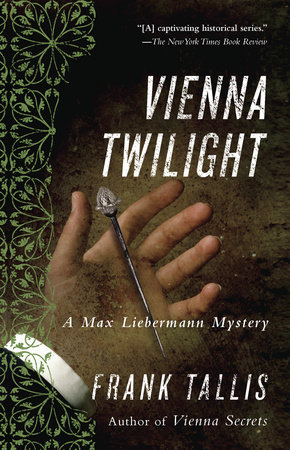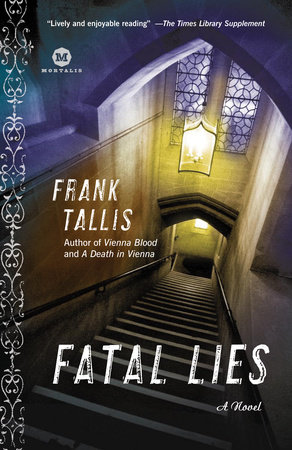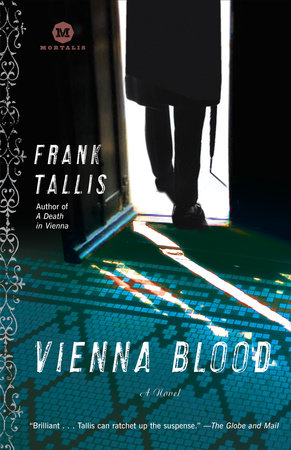Excerpt
Death and the Maiden
1
Detective Inspector Oskar Rheinhardt--a portly gentleman with a turned‑up mustache and world-weary expression--was standing on the sidewalk of a wide tree-lined road. The fog of the previous evening had persisted, and the buildings on both sides were only faintly visible as shadowy cubes, spaced apart at regular intervals. It had been a slow and perilous journey by horse-drawn cab, visibility deteriorating as they’d gained altitude. Indeed, they had only narrowly escaped involvement in a serious collision next to the Kaiser Pavilion.
Rheinhardt turned to address his assistant.
“Search the grounds, Haussmann. See if you can find anything.”
“But, sir . . .”
“Yes, I know that conditions are far from ideal,” said Rheinhardt. “Nevertheless . . .” The inspector removed a flashlight from his pocket and handed it to his disgruntled junior. Haussmann aimed the weak yellow beam at the cobblestones, revealing nothing but a slowly undulating blanket of fog. “Oh, very well,” said Rheinhardt, persuaded to reconsider the wisdom of his order. “You can accompany me. Perhaps it’ll lift later.”
“Thank you, sir,” said Haussmann, much relieved.
A figure emerged from the mist. “Who’s there?”
“Detective Inspector Rheinhardt and my assistant, Haussmann.”
“Good morning, sir. Constable Drasche.”
The young man clicked his heels. He was wearing a long blue coat and a spiked hat, and a sabre hung from his waist.
“How long have you been here, Drasche?” asked Rheinhardt.
“Three hours or thereabouts.”
“I’m sorry for the delay. The driver could barely see the road ahead of him. Who’s inside?”
“Frau Marcus, the housekeeper, and Fraulein Rosenkrantz’s doctor--Engelberg. Frau Marcus called him as soon as she found the body. He was here before I arrived. He’s not in a very good mood, sir.”
“Oh? Why’s that?”
“He didn’t want to be detained. Said he had patients to see.”
The horse was restive, and the driver jumped down from his box to give it some sugar.
“The dead woman,” said Rheinhardt. “Fraulein Rosenkrantz . . .”
Drasche anticipated the inspector’s question. “Yes, it’s her, sir. The singer.”
Haussmann’s sharp features showed perplexity.
“Have you not heard of Ida Rosenkrantz, Haussmann?”
“No, sir. She’s never sung at Ronacher’s.”
Rheinhardt shook his head. “Haussmann, she’s not that kind of singer! She’s an opera singer, a celebrated soprano. You’ll recognize her when you see her. Her image is in every shop window along Karntnerstrasse.”
“Even my tailor has a signed photograph of Fraulein Rosenkrantz,” said Drasche. “He saw her in The Flying Dutchman and was smitten. I can remember teasing him about it.”
The restive horse--still nervous and unsettled--whinnied and stamped on the cobbles.
Rheinhardt pulled at his chin and emitted a low, pensive growl.
“Court Opera singers are only appointed after they have been approved by the palace. I strongly suspect that protocol demands that the emperor--or at least the lord chamberlain, Prince Liechtenstein--must now be informed of Fraulein Rosenkrantz’s demise.”
“You intend to go to the palace, sir?” asked Haussmann, his eyes widening with alarm.
“No, of course not, Haussmann,” said Rheinhardt, a trace of testiness disturbing the otherwise pleasing fluidity of his baritone. “We must contact Commissioner Brugel, and it is he who will inform the lord chamberlain’s office. Come, Drasche, you had better show us the way.”
They passed along a perimeter fence of railings (each of which was topped by a fleur-de-lis) and entered a small garden, where a paved pathway led between two beech trees to the double doors of a white stucco villa. Some of the windows were separated by gilded panels, and a stylized statue of an eagle with angular outstretched wings perched above the entrance. All the ground-floor windows were illuminated.
Drasche opened one of the double doors and ushered Rheinhardt and Haussmann into the hallway. It was a bright space, with yellow wallpaper and floor tiles the color of eggshells. Directly ahead, a carpeted staircase rose up before dividing into two smaller staircases, each reaching the second floor on opposite sides of the building. The air was fragrant with a smell similar to that of blooming hyacinths.
“Ah, there you are, Constable,” said a man as he stepped over the threshold of an adjacent room. He was in his late fifties and wore a frock coat. “I really must protest.”
Before he could continue, Drasche indicated his companions and said, “Herr Doctor Engelberg, this is Detective Inspector Rheinhardt, from the security office.”
“Ah,” said the doctor, frowning. “You’ve finally arrived.”
“Progress was slow on account of the weather.”
“You will forgive me for neglecting to observe the customary civilities, Inspector, but I am obliged to make an immediate request. I have been here all morning, and many of my patients are expecting domiciliary visits. If I am delayed for very much longer, it will be impossible for me to see them all. Would you please take their needs into consideration?”
“You wish to leave as soon as possible,” said Rheinhardt. “Of course, that is perfectly understandable. I will endeavor to conduct our business swiftly. Where is Frau Marcus?”
“In the kitchen. I was just attending to her. She is very distressed.”
“Should she be left alone?”
“Perhaps not.”
“Drasche,” said Rheinhardt. “Would you be so kind as to sit with Frau Marcus?”
The constable took off his helmet and scratched his head. “I’m not very good at that sort of thing, sir--comforting women in distress.”
Rheinhardt sighed. “You don’t have to do anything, Drasche. Just sit with her. Allow her to communicate her feelings if she wishes. But if she is silent, respect that silence and do not speak merely for the sake of it.” Rheinhardt paused before adding, “And be sure to make her a cup of tea.”
“But what if she doesn’t want a cup of tea, sir?”
“Make her one, anyway. I can assure you that she will drink it.”
“Very good, sir.”
Drasche replaced his helmet, bowed, and departed with a noticeable lack of enthusiasm.
When Rheinhardt turned to address Engelberg, the doctor’s hostility had been replaced by surprise and mild-mannered amusement.
“Excellent advice, Inspector.”
Rheinhardt acknowledged the compliment with a slight tilt of his head. “And the body, Herr Doctor?”
“Upstairs.”
They began their ascent.
“What time was it when you received Frau Marcus’s telephone call, Herr Doctor?”
“Around seven-thirty.”
“And what time did you get here?”
“No later than quarter to eight.” Rheinhardt’s expression was skeptical. “I rise very early, you see. I was already dressed, and I live only a short distance away.”
When they reached the landing, Engelberg opened the first of several doors. “She’s in here.”
They entered a richly appointed bedroom where gas jets flickered within globes of smoked glass. A four-poster bed occupied a commanding central position, its heavy curtains tied back with gold cords so as to reveal a counterpane embroidered with a medieval scene: against a backdrop of peacocks and roses stood a noblewoman who was holding a standard displaying three crescent moons. At her feet sat a docile unicorn and a good-humored lion that seemed content to entertain a small white rabbit in the gap between its paws. Two purple stockings had been discarded on the pillows. The wallpaper was striped, burgundy columns alternating with green, with a repeated violin and laurel-wreath motif in raised silver.
Next to the window was a dressing table with a hinged oval mirror, on which several bottles, an amber-colored decanter, and numerous small mother-of-pearl boxes had been casually laid out. Scattered among these items was a tortoisehell comb, several brooches, and a curious totemic object made of hair and beads. Rheinhardt inhaled. The smell of hyacinths had intensified. He looked around and identified its source as a large egg-shaped pomander of fretted ivory; however, the inspector was also conscious of an acrid undertow. In the far corner he saw a wardrobe and beside it a washstand. Instead of the usual porcelain, the bowl and jug were made from a semitransparent turquoise glass, encrusted with jasper.
The overall effect of the room suggested luxury and abundance. Yet there was something distinctly dissolute about the decor. The gemstones and sumptuous colors tested the limits of aesthetic tolerance and awakened prejudices. Rheinhardt found himself thinking that he had entered not the bedroom of an operatic diva but a seraglio.
Engelberg crossed to the other side of the room and made a sweeping gesture. Rheinhardt and Haussmann followed, and as they rounded the bed, Fraulein Rosenkrantz’s lifeless form came into view. The dead woman was lying on her back, positioned within the rectangle of a Persian rug. It was a pleasing effect, possessing the compositional virtues of a painting. She was wearing a pink silk dress overlaid with a lacy decollete trim. Her complexion was pale, and her plenteous auburn curls complemented a youthful face of exceptional delicacy. Fraulein Rosenkrantz’s eyes were closed, and the almost perfect ovals of her fingernails were tinged with a bluish hue. She was not wearing any shoes, and her bare feet projected out from a sufficiency of petticoats. On the floor, next to the rug, was a vial. Its stopper had rolled beneath a bedside table on which more empty bottles stood.
“Herr Doctor?” said Rheinhardt. “Did you move Fraulein Rosenkrantz when you examined her?”
“No. She remains exactly as found.”
“What about Frau Marcus? Did she move Fraulein Rosenkrantz’s body?”
“I don’t think so. As far as I know she made no attempt to revive or resuscitate her.”
Rheinhardt stepped closer. “How did Fraulein Rosenkrantz die?”
“It would appear that she imbibed an excessive quantity of laudanum.”
“Intentionally?”
“That is certainly a possibility . . .”
“However?”
“I can think of no reason why she should have chosen to end her life. I take it you are aware of Fraulein Rosenkrantz’s reputation? She was at the height of her powers. There are few who can claim to have conquered the hearts of the music-loving public so decisively. We have been robbed of a singular talent, make no mistake.”
“When was the last time Fraulein Rosenkrantz had cause to request a consultation?”
“Only two weeks ago.”
“With respect to . . . ?”
“A touch of neuralgia, but otherwise she was in excellent spirits. I can remember her talking excitedly about roles she expected to take next season.”
“So what are we to conclude, Herr Doctor? That her death was accidental?”
“That would be my opinion . . .” Engelberg’s sentence trailed off into silence. He sighed and began again: “That would be my opinion, were it not for the fact that Fraulein Rosenkrantz once needed the services of a psychiatrist. In the spring I arranged for her to see Professor Daniel Saminsky.” Engelberg paused before adding, “A colleague of some distinction. He once had the honor of attending the late empress, and has since been awarded the Order of Elizabeth.”
Rheinhardt twisted the horns of his mustache.
“What was the reason for the referral?”
“Globus hystericus,” Engelberg replied.
“Would you care to explain?”
“A hysterical phenomenon--typically the patient reports the presence of a lump in the throat that produces difficulty when swallowing. Physical investigations reveal no obvious obstruction, and the lump, or rather the perceived lump, is subsequently ascribed to psychological causes. Globus hystericus is not a diagnosis that we doctors commonly associate with suicide. And to the best of my knowledge Professor Saminsky’s treatment was effective.”
Rheinhardt walked over to the bedside table, picked up one of the bottles, and sniffed the pungent residue.
“Did you prescribe these tinctures?”
“No.”
“Then who did?”
“Professor Saminsky, I believe.”
“Didn’t you say that Saminsky’s treatment was successful?”
“That is correct. Nevertheless, he continued to see Fraulein Rosenkrantz for monthly appointments.” Engelberg raked his hand through his hair. “No doctor can be absolutely certain of a patient’s state of mind. If Fraulein Rosenkrantz was suffering from suicidal melancholia, it not only escaped my notice, it also escaped Professor Saminsky’s.”
Rheinhardt replaced the bottle.
“Herr Doctor, you say that Fraulein Rosenkrantz was fully recovered. Why, then, was she taking laudanum?”
“To hasten the onset of sleep. Difficulty sleeping was another of her problems. She has taken paraldehyde, sulphonal, potassium bromide, and a host of herbal remedies. The laudanum has nothing to do with her globus hystericus.” Engelberg patted his pocket and removed a cigar. “May I smoke, Inspector?”
“Of course,” said Rheinhardt, taking a box of matches from his pocket and courteously providing a light. “Herr Doctor, looking at Fraulein Rosenkrantz’s body, does anything strike you as odd?”
“I’m not sure what you mean, Inspector.”
“Her position,” said Rheinhardt. “In the center of the rug.”
Engelberg shrugged and surrounded himself with a yellow nimbus of smoke. “Inspector, imagine, if you will, the following: Fraulein Rosenkrantz retires to her bedroom. She cannot sleep. She takes some laudanum but it has little effect. Those of a nervous character, as she undoubtedly was, are often less susceptible to soporifics.” He sucked at his cigar and flicked some ash into an onyx dish. “She waits, but remains incorrigibly awake. Becoming impatient, she drinks another vial. Although she feels the laudanum isn’t working, it most certainly is. She is no longer fully compos mentis. She cannot remember how much she has taken, and she is confused. In this disoriented state she takes yet more laudanum, and the dose is now fatal. She sits on the side of the bed and removes her shoes and stockings. As she bends down, she becomes dizzy. She slides off the bed and onto the floor. She rolls over, onto the rug, and closes her eyes.” Engelberg shrugged again. “It might well have happened like that, Inspector--an accident, a cruel tragedy of mischance.”
Rheinhardt lifted the counterpane and looked under the bed, where he saw a pair of brown leather ladies’ shoes. He then examined the coverlet more closely, searching for small indications consistent with Engelberg’s scenario. It was all very plausible, but when Rheinhardt looked again at Fraulein Rosenkrantz’s body, positioned so neatly within the rectangular limits of the Persian rug, he could not quash a nagging doubt.
“Thank you, Herr Doctor,” said Rheinhardt. “You have been most helpful.”
“May I leave now?”
“I must ask you to give Haussmann your details first.” The inspector glanced at his assistant. “Then you are free to go. Once again, please accept my apologies.”
Rheinhardt bowed and left the room. He made his way downstairs to the kitchen, where he found Constable Drasche sitting next to a middle-aged woman whose eyelids were raw and swollen. Rheinhardt pulled a chair from under the large wooden table and noted with some satisfaction the presence of an empty teacup.
“My name is Rheinhardt,” he said softly. “I am the detective inspector.” He sat down. “It must have been a great shock.”
A prolonged silence followed, during which the housekeeper twisted a damp handkerchief. “Terrible.”
“Frau Marcus,” said Rheinhardt, “when did you discover Fraulein Rosenkrantz?”
“Seven-thirty.”
“I know that this is difficult, but I must ask you to tell me what happened, precisely.”









